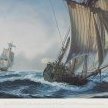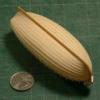Supplies of the Ship Modeler's Handbook are running out. Get your copy NOW before they are gone! Click on photo to order.
×
-
Posts
5,885 -
Joined
-
Last visited
Reputation Activity
-
 lmagna reacted to moreplovac in Sultana 1767 by moreplovac - FINISHED - Model Shipways - 1/64 - Colonial Schooner
lmagna reacted to moreplovac in Sultana 1767 by moreplovac - FINISHED - Model Shipways - 1/64 - Colonial Schooner
Thanks Lou, appreciated.
-
 lmagna reacted to Jaager in Licorne 1755 by mtaylor - 3/16" scale - French Frigate - from Hahn plans - Version 2.0 - TERMINATED
lmagna reacted to Jaager in Licorne 1755 by mtaylor - 3/16" scale - French Frigate - from Hahn plans - Version 2.0 - TERMINATED
Mark,
You might could consider using linen thread as is.
I bought the following from Colophon Book Arts Supply :
Londonderry linen thread
dia dia 1/48 circ 1/48 dia 1/60 circ 1/60
100/3 0.009 0.42 1.3 0.53 1.6
80/3 0.01 0.48 1.5 0.48 1.9
50/3 0.012 0.6 1.9 0.75 2.3
The price is < $3.00 and delivery was fast.
Since it is already 3 strands laid you can use it straight up.
As for holding the blocks
I bought some Dritz Quilting Crystal Glass Head Pins,
that are 1 3/4" long and are # 76 wire gauge
that may not be too large a hole for the rope and
if you nip off the bead and mount it on a piece of wood - there is a lot of up/down play before a block would come off the top
The bead could be nipped after even.
I don't know how Londonderry does their 100/3 - I have trouble laying up 62/1 yarn - it breaks before I can get long lengths
-
 lmagna reacted to moreplovac in Sultana 1767 by moreplovac - FINISHED - Model Shipways - 1/64 - Colonial Schooner
lmagna reacted to moreplovac in Sultana 1767 by moreplovac - FINISHED - Model Shipways - 1/64 - Colonial Schooner
Today i have been working on deck planking and on hole for rudder. Also i stained few planks that i will be using for deck planking..
I decided to change a process of planking, staining, etc and to go with following sequences:
cut planks in length - sand plank - stain plank - do the deck planking - varnish planks - do a "treenail" simulation - light sanding - another layer of varnish. I believe (and also getting some ideas from other forum members, more experienced than myself) this process will prevent getting stain into wood grain as well as into treenail simulation. Will see how it goes..
Planks cut and stained in golden oak..
Then i needed to hold the model in more steady position in order to continue with planking. For this planking job, the planks are shorter than for the rest of deck planks (appr 2.4 cm) and the model should be steady sitting and not moving around. Did not want to cut the wood at 11pm so i found few appropriate pieces that can be utilized..
I think pictures are self explanatory. The idea is that for future builds of the similar size, i can use the same cradle and just replace the foam parts that will be cut in the hull shape.
The ship fits very nicely in the cradle..
It is time to drill a hole for a rudder. Since the hole needs to be drilled very close to the edge and under certain angle, several supporting items (did not have enough hands to take a picture while holding ship and supports) are used throughout the process.
After some sanding, it is time to test the fitting of a rudder..
So, lets do deck planking now..
And completed..
Planks are oversized and hanging over the board but will be sanded later.
The hole is cut for a rudder on new planked deck and rudder was tested for fitting...
Done for today.
Happy modeling..
-
 lmagna reacted to Vegaskip in Ship paintings
lmagna reacted to Vegaskip in Ship paintings
Five of the six paintings for the Easter Weekend Exhibition and Sale at St Andrew Blackadder church at North Berwick. Bring your 'plastic'.
Jim
-

-
 lmagna reacted to Vegaskip in Ship paintings
lmagna reacted to Vegaskip in Ship paintings
A little change .
Pencil sketch Trawler 'United Boys and 'Bervie Braes'
10 X 7 inches
-

-
 lmagna reacted to popeye the sailor in The Tumblin' Dice by popeye the sailor - Artesania Latina - 1:80 - Mississippi riverboat
lmagna reacted to popeye the sailor in The Tumblin' Dice by popeye the sailor - Artesania Latina - 1:80 - Mississippi riverboat
I hear ya Sam..........working on it as we speak!
so I see Chris........I will have to look at Don's log...haven't done that yet. I'm going to try a different approach.......these darn instructions don't show very much. I should be used to it.......being a Billing Boats builder. I will have an update .....did a little yesterday. wrong in the assumption that I didn't go too far.....I did... now it's damage control time and it may include some scratch building anyway. so be it!
-
 lmagna reacted to John Allen in T78 Norden by popeye the Sailor - FINISHED - Billing Boats - 1:30
lmagna reacted to John Allen in T78 Norden by popeye the Sailor - FINISHED - Billing Boats - 1:30
Popeye,
If the net was made from mono filament it would not lay straight and tend to bunch up.
If it was cotton the weight from water after retrieving would make it lay straighter.
Add the cork line and lead line with catch both would be lay straight when being retrieved.
Now it looks like it is being retrieved by the winch rollers if the net was partially over the side with the weight of catch it would be straight. The catch as you know would be taken out as it is hauled in by the winch.
If it is displayed like you have it I am assuming all catch has been removed and the deckhands have plied out some net on deck to straighten it out then rewind that portion back onto the winch rollers after a hard days fishing before they return to the dock. Use whatver strikes your fancy. Very nice build KUDOS
-
 lmagna reacted to src in T78 Norden by popeye the Sailor - FINISHED - Billing Boats - 1:30
lmagna reacted to src in T78 Norden by popeye the Sailor - FINISHED - Billing Boats - 1:30
The whole build looks good Dennis. I like the net you used, the others were too "perfect". I like the kinds of ratty used look.
As for how cod looks, I like the "Golden Brown on a bed of Chips" look myself. With an adult brewed beverage and some malt vinegar.
Yours however look like they are ready to be filet and fried up tasty like. Well done.
Sam
-
 lmagna reacted to CDW in Bismarck by Semorebutts - FINISHED - Trumpeter - 1/200 scale - PLASTIC - with MK1 detail set
lmagna reacted to CDW in Bismarck by Semorebutts - FINISHED - Trumpeter - 1/200 scale - PLASTIC - with MK1 detail set
Many moons ago, airbrushes and compressors were way out of the price range most modelers could afford (me included) and most all of us did all our paint work by brush or either did no paint at all. Today I am spoiled with airbrush finishes but still resort to the brush from time to time.
-
 lmagna reacted to semorebutts in Bismarck by Semorebutts - FINISHED - Trumpeter - 1/200 scale - PLASTIC - with MK1 detail set
lmagna reacted to semorebutts in Bismarck by Semorebutts - FINISHED - Trumpeter - 1/200 scale - PLASTIC - with MK1 detail set
Interesting Popeye!
the blast bags have been painted white. Brushed on and I hated it. But it came out good. Now just to apply shading and big guns are done.
While that dried I prepared all of the parts for the next 6 gun turrets.
-
 lmagna reacted to Mike Y in Treenail Size Question
lmagna reacted to Mike Y in Treenail Size Question
The treenail colour also matters a lot. Real treenails are basically invisible, you need go come very close to see them (except iron bolts). Model ones are mostly an aesthetics choice, where colour contrast affects visual size much more than the diameter.
It would be wise to make a large enough test piece, using the same wood and plank size as on a real model, and then experiment with various woods and sizes. Always put the finish on, since it changes the treenail colour a lot (absorbing into endgrain differently than into the plank).
if you add various finishes in the mix - the number of test boards might increase
-
 lmagna reacted to Jaager in Treenail Size Question
lmagna reacted to Jaager in Treenail Size Question
From the ASA 1885
Tree nails
outside planking
plank thickness treenail inches
1 7/8
2.5 1
3-3.5 1.125
4-4.5 1.25
5-5.5 1.375
6- < 1.5
I 'll leave it to you to divide by 48 to get model scale
Since the physics did not change and at scale - any difference in scantlings over the 200 years hard to notice
this should be ballpark enough. The largest is #68 gauge at scale - not easy to draw and easy to break.
-
 lmagna reacted to mtaylor in Treenail Size Question
lmagna reacted to mtaylor in Treenail Size Question
Lou, I think has it about right. But there's also the variables of where the treenails are being used... deck? upper hull? Underwater hull? Beams? etc... And then there's which nation? The French used a combination of wood and iron nails.
-
 lmagna got a reaction from thibaultron in Treenail Size Question
lmagna got a reaction from thibaultron in Treenail Size Question
About 1/4 of the real size. Sorry I couldn't resist.
No really. I don't know what era or type of ship you are building but at least one research paper states that based on excavations at Pacific Wharf in Rotherhithe England that in the 16th and 17th century they were made in three sizes and seemed to be about 1" for every hundred feet.
Others here may have more precise information. Hope that helps.
Lou
-
 lmagna got a reaction from mtaylor in Treenail Size Question
lmagna got a reaction from mtaylor in Treenail Size Question
About 1/4 of the real size. Sorry I couldn't resist.
No really. I don't know what era or type of ship you are building but at least one research paper states that based on excavations at Pacific Wharf in Rotherhithe England that in the 16th and 17th century they were made in three sizes and seemed to be about 1" for every hundred feet.
Others here may have more precise information. Hope that helps.
Lou
-
 lmagna reacted to Piet in T78 Norden by popeye the Sailor - FINISHED - Billing Boats - 1:30
lmagna reacted to Piet in T78 Norden by popeye the Sailor - FINISHED - Billing Boats - 1:30
Your cod looks great and the net should look "lumpy" as you have it. It's been working catching fish and is normally not layed out nice and neat.
Cheers,
-
 lmagna reacted to BANYAN in T78 Norden by popeye the Sailor - FINISHED - Billing Boats - 1:30
lmagna reacted to BANYAN in T78 Norden by popeye the Sailor - FINISHED - Billing Boats - 1:30
The netting size , look and feel appear right Denis. Cannot comment on the positioning or 'how it lays on deck' not having worked on trawlers.
cheers
Pat
-
 lmagna reacted to usedtosail in T78 Norden by popeye the Sailor - FINISHED - Billing Boats - 1:30
lmagna reacted to usedtosail in T78 Norden by popeye the Sailor - FINISHED - Billing Boats - 1:30
That net looks good to me, Popeye.
-
 lmagna reacted to DocBlake in HMS Fly by drobinson02199 - FINISHED - Victory Models - Scale 1:64 - with upgrade kit
lmagna reacted to DocBlake in HMS Fly by drobinson02199 - FINISHED - Victory Models - Scale 1:64 - with upgrade kit
That looks great. A good base for the second planking!
-
 lmagna reacted to drobinson02199 in HMS Fly by drobinson02199 - FINISHED - Victory Models - Scale 1:64 - with upgrade kit
lmagna reacted to drobinson02199 in HMS Fly by drobinson02199 - FINISHED - Victory Models - Scale 1:64 - with upgrade kit
Wood filler and sanding applied to first planking, plus a coat of varnish. Now ready for second planking.
Regards,
David
-
 lmagna reacted to drobinson02199 in HMS Fly by drobinson02199 - FINISHED - Victory Models - Scale 1:64 - with upgrade kit
lmagna reacted to drobinson02199 in HMS Fly by drobinson02199 - FINISHED - Victory Models - Scale 1:64 - with upgrade kit
Chris:
The wood filler is easily damaged if left "naked" on the hull, and varnish seals it in. Varnish also gives me a surface that grips the second layer just a bit more slowly, so I have time to align things. But the sealing of the filler is the main reason.
Regards,
David
-
 lmagna got a reaction from druxey in Treenail Size Question
lmagna got a reaction from druxey in Treenail Size Question
About 1/4 of the real size. Sorry I couldn't resist.
No really. I don't know what era or type of ship you are building but at least one research paper states that based on excavations at Pacific Wharf in Rotherhithe England that in the 16th and 17th century they were made in three sizes and seemed to be about 1" for every hundred feet.
Others here may have more precise information. Hope that helps.
Lou
-
 lmagna reacted to Rustyj in HM Cutter Cheerful 1806 by Blue Ensign - FINISHED - Syren Ship Model Company - 1:48 scale
lmagna reacted to Rustyj in HM Cutter Cheerful 1806 by Blue Ensign - FINISHED - Syren Ship Model Company - 1:48 scale
Very good B.E.The work to do all of the tick strips and marks will pay off when planking the belts.





